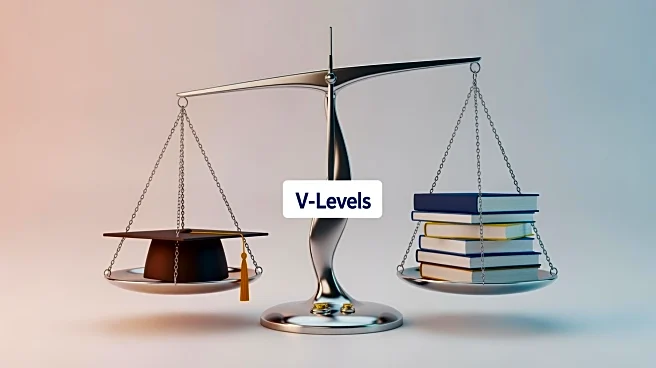What's Happening?
The UK government has announced the introduction of V-Levels, a new vocational qualification for students aged 16 to 19 in England. This initiative aims to streamline the post-GCSE educational landscape
by providing an alternative to A-Levels and T-Levels. V-Levels are set to replace approximately 900 existing level-3 vocational qualifications, offering students the flexibility to combine them with A-Levels. Education Secretary Bridget Phillipson emphasized that the new courses would simplify a fragmented system and provide a vocational route into careers. The government is also planning to introduce legislation for inflation-linked tuition fee increases starting in 2026, contingent on universities meeting new quality thresholds.
Why It's Important?
The introduction of V-Levels is significant as it addresses the need for more diverse educational pathways for young people in England. By offering alternatives to traditional academic routes, the government aims to cater to students who may prefer vocational training over university education. This move could potentially increase the number of students pursuing technical qualifications, aligning with Prime Minister Sir Keir Starmer's target for two-thirds of young people to go to university or study a technical qualification. The initiative also highlights the government's commitment to investing in further education and ensuring there are enough teachers to deliver these new courses.
What's Next?
The government has launched a consultation on the V-Level plans, which are part of its post-16 education and skills white paper. It is not yet clear when V-Levels will be introduced or which subjects will be available, but the Department for Education has mentioned craft and design and media, broadcast and production as examples. The Sixth Form Colleges Association has warned that V-Levels may not fully replace BTecs, and campaigners stress the importance of maintaining alternatives to A-Levels and T-Levels. The government is expected to lay out proposals for higher education funding, including university tuition fees, in the near future.
Beyond the Headlines
The introduction of V-Levels could have long-term implications for the UK's educational system, potentially shifting the focus from traditional academic qualifications to vocational training. This change may influence the job market by increasing the availability of skilled workers in technical fields. Additionally, the government's plan to reduce the number of teenagers resitting maths and English GCSEs by introducing a new 'stepping stone' qualification could help break down barriers to opportunity, particularly for white working-class pupils who are more likely to need resits.









